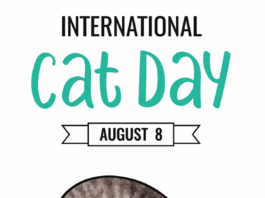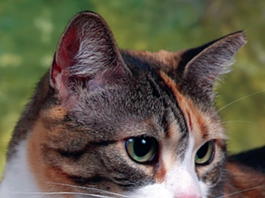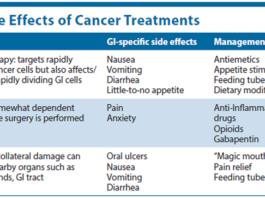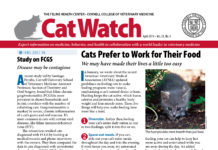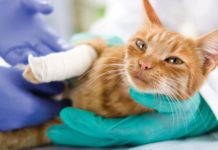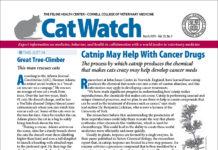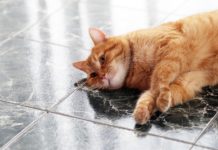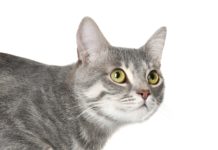Cats Prefer to Work for Their Food
In January, we wrote about the recent American Veterinary Medical Association (AVMA) updated guidelines on feeding cats to make feeding programs more natural, emphasizing a cats natural desire to hunt. Hunting keeps the cat active, which burns calories and promotes a healthy body weight and lean muscle mass. These five things will help you make feeding time more like a hunt.
Download the Full April 2019 Issue PDF
Download the Full April 2019 Issue PDF
What Emergency Clinics See Most
Emergency clinics and urgent-care after hours at regular veterinary clinics are on the rise for good reason: They save lives. But they are more expensive, and they dont take appointments, which sometimes means a long wait. In March, we talked about common symptoms of serious illness in cats and when they warrant a veterinary emergency. In this issue, we discuss common metabolic and systemic diseases and when they constitute an emergency.
Feline Physical Rehabilitation
The days of hearing, Its just a cat, are thankfully fading fast. Owners are increasingly more attuned to behavioral and physical changes in their cats that indicate injury or illness, and more enthusiastic about pursuing diagnostics and treatments to achieve the best possible outcome.
Research Finds Two New Feline Viruses
An article in American Veterinarian says that researchers recently identified two novel viruses in the domestic cat: gammaherpesviruses and feline morbilliviruses. The Felis catus gammaherpesvirus 1 (FcaGHV1) was discovered in 2014, and feline morbillivirus was originally found in 2012.
Normal vs Excessive Shedding
Shedding is a normal part of life for mammals-old hairs fall out, allowing new hair to grow in. Animals shed year-round with typically two heavy periods in spring and fall-building up and getting rid of a winter coat, says William Miller, VMD, DACVD, Dermatology Section Chief at the Cornell University School of Veterinary Medicine. During these times of the year, it may seem like there is more hair on the floor than on the cat.
5 Things Feline Food Facts You Need to Know
Diets must include nutrients that a cat cannot get elsewhere
Download the Full March 2019 Issue PDF
Download the Full March 2019 Issue PDF…
Feline Pancreatitis May Be Chronic
When pet owners think of pancreatitis, often the image that comes to mind is a dog who does a garbage raid and consumes a bunch of spoiled or fatty food. Dietary indiscretion usually is not considered a cause of pancreatitis in cats, perhaps because cats are more fastidious in their eating habits!
Five Things to Know About Supplements
Colorful advertisements boasting enticing benefits may compel us to purchase nutritional supplements for our cat. After all, we all want whats best for our kitty. But if youre feeding a quality cat food, youre likely all set. Good cat food manufacturers hire veterinary nutritionists who follow guidelines from the Association of American Feed Control Officials (AAFCO) to ensure that the foods are nutritionally complete and balanced. You shouldnt need to purchase a supplement unless your cat has a specific problem.
Good-Bye Severe Sinus Problems
Despite the disturbing definition that will first appear if you do an internet search for rhinotomy (mutilation or amputation of the nose), this procedure can be beneficial to cats experiencing chronic nasal problems. There are two primary surgical techniques: dorsal rhinotomy and ventral rhinotomy. In both cases, the surgeon removes part of the bone surrounding the cats sinuses in order to gain access to the sinus and remove the source of the problem, be it a foreign body, a tumor, or infected tissues.
Tooth Resorption
Tooth resorption, still sometimes referred to as feline odontoclastic resorptive lesions or FORLs, is a common and painful condition affecting cats teeth. In cats with this condition, one or more teeth slowly break down and resorb, exposing the pulp of the tooth. Estimates of how many cats are affected by tooth resorption range from 20 to 60 percent.


